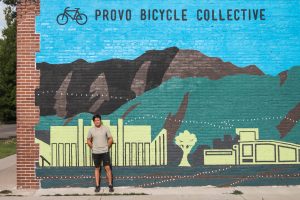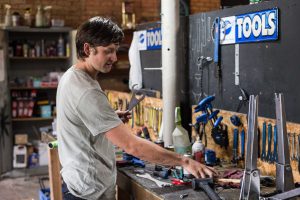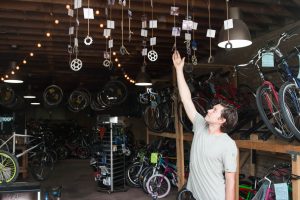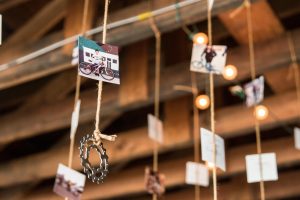Austin Taylor makes his way to the juvenile detention center twice a week and teaches youths how to fix bikes, hoping they’ll develop a marketable skill and a stable life. By the end of the 12-week course, they’ll earn a free bike.
When Taylor talks about his service to the community, it always comes back to bikes and the Provo Bicycle Collective.
“It’s a huge part of his life,” said Austin’s wife, Elise Taylor.
In 2012, Austin started volunteering for the Provo Bicycle Collective, a non-profit organization dedicated to teaching the community how to repair bicycles and giving back.
Lee, the Provo Bicycle Collective part-time mechanic who has also been a volunteer for over a year, said the collective used to be less organized and less focused on service.
The collective was a group of “bike enthusiasts” who were building “fun bike builds” and playing bike soccer in an old garage at the edge of town, according to Lee.
Now located at 397 E. 200 North, the Provo Bicycle Collective is “nice and new,” Lee said.
“Pretty much everything that you see is Austin’s work: all the organization, all the structure to the programs,” Lee said.

In 2015, Austin was hired as the director of the Collective, and set out to make the nonprofit more focused on service.
When Austin came to college, he chose to ride a bike instead of driving a car. At first, he bought tools to fix the bike himself, but soon decided it was too expensive. He would go to the Provo Bicycle Collective to get help on his bike, which led to him volunteering there.
“I wanted to use the skills I had to help others get the same experience I was getting out of it,” Austin said.
Austin said the greatest motivating factor in doing bicycle-related service is bikes are “a tool to bring people together.”
“It gets people out of this anonymity of the car,” Austin said. “You can’t see who’s driving next to you. They’re trapped behind all of the steel and glass. Putting someone on a bicycle exposes them to the world, and they get to see things and interact with their environment.”
Austin said bikes also remove social divides. He said people who can’t afford a car will sometimes ride a bike as their mode of transportation.
“That’s by their financial position,” Austin said. “Having somebody that’s making a big salary riding a bicycle next to somebody who can’t afford a car brings them literally closer together.”

He also said riding bikes helps the environment and air quality.
“Each person riding a bicycle doesn’t have to pollute, and so especially with a place like Utah County where there’s so much smog in the winter and the inversion, every person we can get riding a bicycle helps,” Austin said.
Austin not only runs the bike shop and programs at the collective; he also trains volunteers. This year, he projects the collective will have over 700 volunteers. These volunteers take the used bikes, fix them up and then donate many to people who need them.
As director, Austin has created the Juvenile Justice Mechanics program, the Earn-a-Bike program and the Goodwill Bikes program.
The Earn-a-Bike program is a four-week course that teaches children how to repair a bike. Those who can’t afford the fee can receive a need-based scholarship. Kids are encouraged to keep their bike or donate it to a child in need.
Austin said he sees this program as a way of helping people in the future.
“(It) will kickstart them into a lifetime of physical activity and environmentally responsible transportation,” Austin said.
Lee said Austin is focused on how his service affects people in the community.
“He’s never satisfied with just OK,” Lee said. “He’s always looking for ways to improve.”
Austin adapted the Goodwill Bike program from the Salt Lake City Bicycle Collective to work with other nonprofit organizations to provide bike donations to people in need.
“A lot of time when somebody’s going to therapy, or maybe they’re being resettled as a refugee … they have appointments that they need to make and on top of that they need to live normal lives like the rest of us,” Austin said.
Austin said someone can earn a bike with four hours of volunteer work.
“Sometimes I see these people riding in the street with me, just going to and from, and it’s really cool to know because of the work that me and my team were able to do, this person has mobility and can get around,” Austin said.
Elise said Austin is dedicated to making bikes readily available to people in the community and making Provo a safe, bikeable city. He volunteers with Provo Mayor John Curtis’ Provo Bicycle Committee and BYU’s campus Bicycle Committee.
“He’s really just trying to be involved with the city and BYU, and he really tries to reach out to help kids learn how to ride their bikes and fix them and be safe on their bikes,” Elise said. “He’s been really good to the homeless population that come and volunteer a lot at the collective too.”
But his service doesn’t stop with bikes. His wife said he’s always the first person to “jump in and help out” with cleaning the church or helping at a neighborhood service day.
“He’s always up for helping people around him,” she said.

Austin and Elise have been married for about a year now, and Elise said Austin’s service has had an influence on her.
“It’s helped me to want to serve more in the community and just to be more involved in things outside of work,” she said.
Austin, a Latin America studies major and nonprofit management minor, said his BYU education has lent to his volunteer work.
In a volunteer management course he took, Austin’s professor said nonprofits should emphasize their mission, print it out and put it up in the establishment. That same day, he decided to put the advice into practice and hung a mission statement on the wall of the Provo Bicycle Collective.
“Now when people come in, they understand what we do,” Austin said. “We help thousands of people each year at our bike shop to fix their bicycles, and for people who get free bikes and all that, they understand what we do just because we have that statement on there.”

According to his wife, Austin contributes 25–30 hours of work to the Collective and the community during the school year and more than 40 hours per week during the summer. But Austin said other volunteers deserve much of the credit for the collective’s work.
“It’s definitely not just me,” he said. “I’m only one person. There’s no way that I could put out the number of bikes that we do. I have a lot to owe to my staff and volunteers.”




